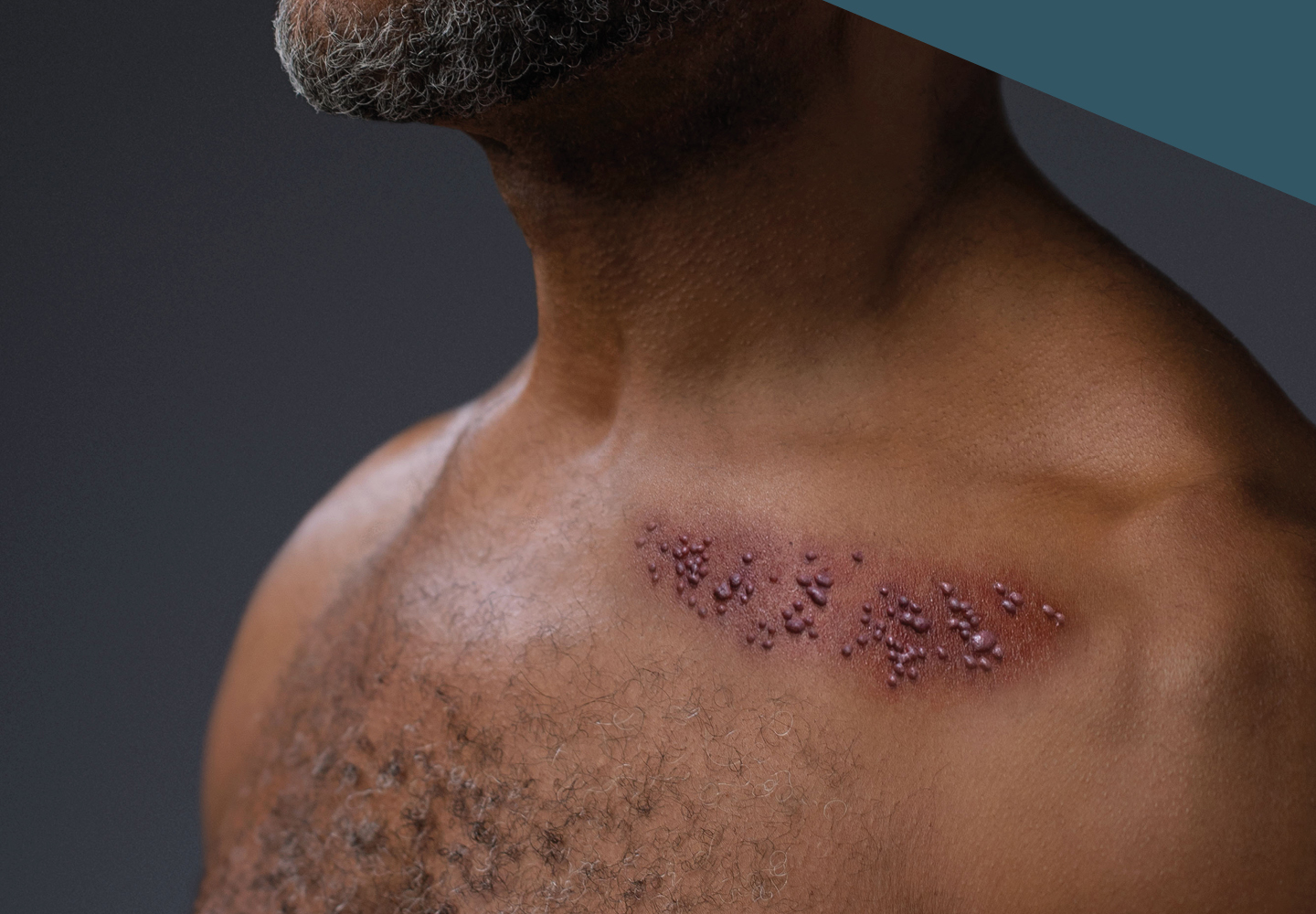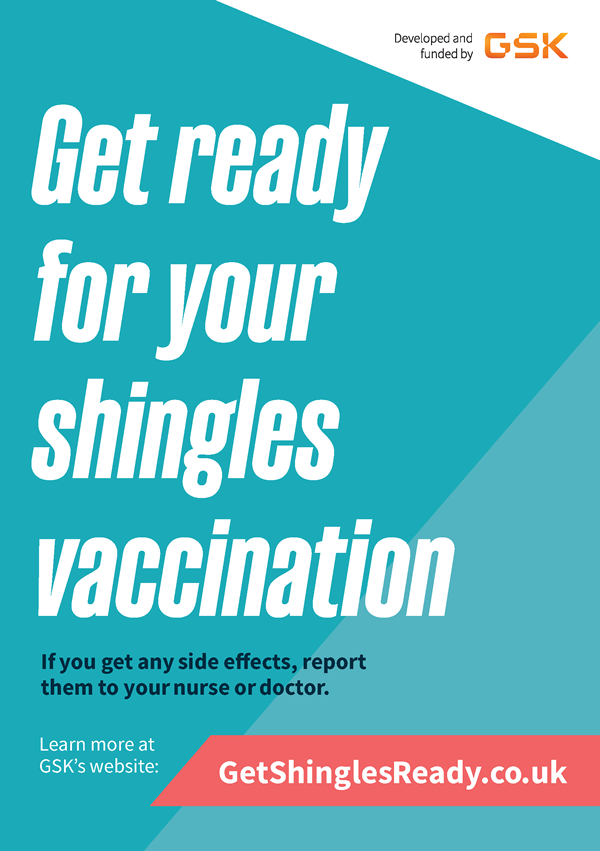

What is shingles?
Shingles is an infection which typically causes a painful rash on one side of the body.
Shingles, also known as herpes zoster, is caused by the reactivation of the varicella zoster virus, the same virus that causes chickenpox.
Following a chickenpox infection, which typically occurs in childhood, the varicella zoster virus remains dormant in the body for life, usually not causing any problems or symptoms. Our immune system naturally weakens over time as we age which may allow the usually inactive virus to reactivate, causing shingles.
The first signs and symptoms of shingles can be a tingling or painful feeling in an area of skin, a headache or feeling generally unwell. Typically, a blistering rash may appear a few days later on one side of the body only.
Usually, the shingles rash appears on the chest and abdomen, but it can appear anywhere on your body including on your face.
It can take up to 4 weeks for the rash to heal.
If you think you may have shingles, please seek prompt medical attention.
Some people may experience complications. The most common complication of shingles is post-herpetic neuralgia (PHN) which is experienced as nerve pain that persists after the shingles rash has healed. PHN typically lasts for three to six months but can persist for longer. It can be more common and more severe in older people than in younger people. After the age of 50 years, about 20% of patients with shingles will develop post-herpetic neuralgia (PHN).
Other complications may also include:
- Skin changes – scarring or changes in pigmentation after the rash has healed
- Secondary infection of the shingles rash
- Visual or hearing problems may occur if the virus affects relevant nerves
- Nervous system complications
- Negative impact on quality of life
This is not an exhaustive list of complications which can arise from shingles. Please speak to a healthcare professional for more information.
Shingles occurs when the virus that’s already in your body reactivates, so it cannot be passed from one person to another. However, since the virus that causes chickenpox and shingles are the same, if a person who has never had or isn’t protected against chickenpox comes into direct contact with the blisters of someone with shingles, they may get chickenpox.
Shingles, also known as herpes zoster, is caused by the reactivation of the varicella zoster virus, the same virus that causes chickenpox. Following a chickenpox infection, which typically occurs in childhood, the varicella zoster virus remains dormant in the body for life, usually not causing any problems or symptoms. Our immune system naturally weakens over time as we age which may allow the usually inactive virus to reactivate, causing shingles.
If you've never had chickenpox, you are not at risk of shingles but remain at risk of chickenpox. However, it is also possible that you might not recall having had chickenpox as the infection usually occurs in childhood or you could also have been exposed to the virus without knowing. In fact, 9 out of 10 adults in the UK have evidence of previous chickenpox infection.
A person's risk of developing shingles increases with age. This is because the immune system naturally weakens over time as you age. This natural decline in immunity leads to an increased risk of shingles no matter how healthy you may feel.
The incidence of shingles increases with age, particularly in adults 50 years of age or older.
Older adults are also at increased risk of complications such as post-herpetic neuralgia (PHN).
How is shingles managed?
Treatment:
If you think you may have shingles, please speak with your healthcare professional as soon as possible. They may prescribe appropriate medicines to help reduce the severity and duration of your symptoms.
General advice for managing symptoms:
- Keep the rash clean and dry to reduce the risk of infection
- Wear loose-fitting clothing
- Use a cool compress a few times a day
Prevention:
Vaccination to help protect against shingles is available for free on the NHS to eligible individuals.
Individuals turning 65 years old on or after September 1st 2023, those aged 70-79 years old and individuals aged 50 years or older with a severely weakened immune system are now eligible. Those aged 18-49 receiving a stem cell transplant may also be eligible. Find out more here.
The Shingles National Immunisation Programme is a NHS vaccination programme to help protect against shingles.
Find out more and check eligibilityFurther resources
A selection of GSK resources which contain information about the National Immunisation Programme eligibility can be found here.
More information
If you’re still unsure about your eligibility or you want to learn more about shingles and the Shingles National Immunisation Programme, speak to your nurse or GP surgery.
Reporting of side effects
If you get any side effects following vaccination, talk to your doctor, nurse, or pharmacist. This includes any possible side effects not listed in the package leaflet.
You can also report side effects directly via the Yellow Card Scheme Website: yellowcard.mhra.gov.uk.
By reporting side effects, you can help provide more information on the safety of medicines.
References
- NHS. Shingles. 2023.
- DH Green Book Ch 28a. Shingles. 2024.
- NICE Clinical Knowledge Summaries. Shingles: What are the complications. 2024.
- Johnson R et al. Ther Adv Vaccines. 2015; Vol. 3(4): 109–120.
- Gauthier A et al. Epidemiol Infect. 2009; 137: 38-47.
- Drolet M et al. CMAJ. 2010; 182(16): 1731–1736.
- Lukas K et al. J Public Health. 2012; 20:441-451.
- DH Green Book Ch 34. Varicella. 2019.

